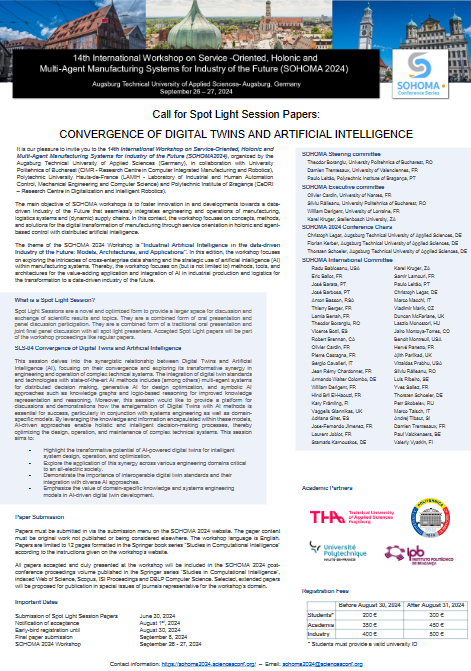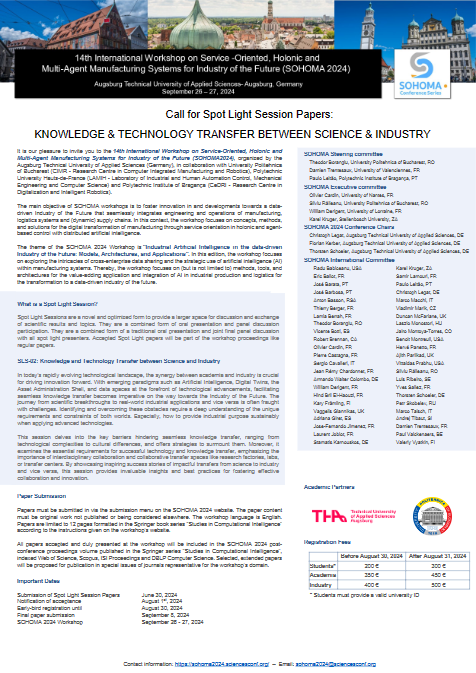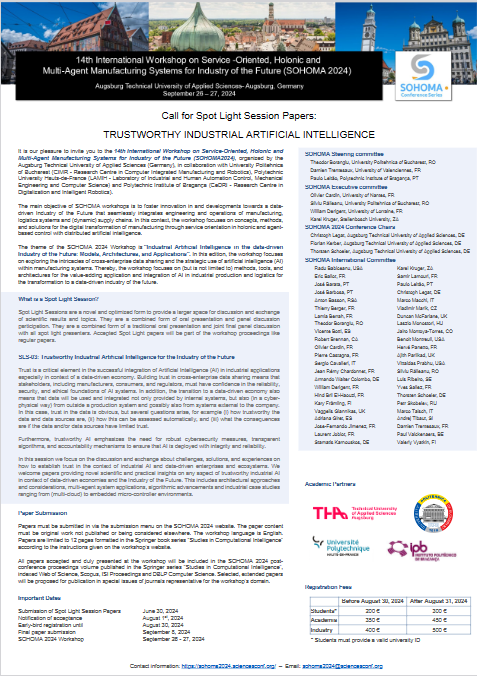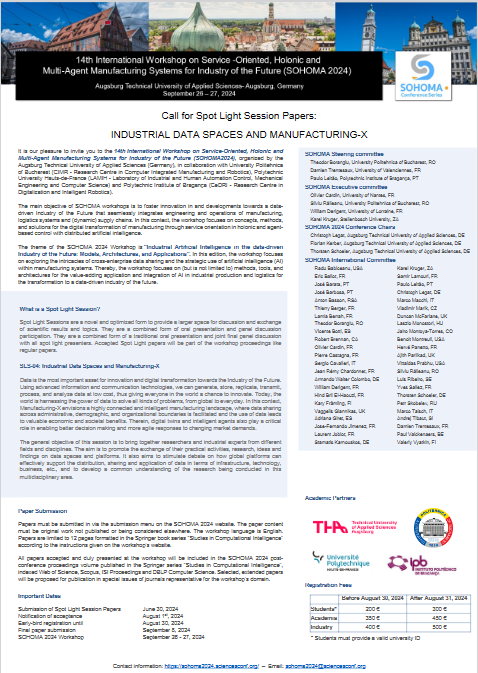
|
|
|
Call for Papers > Spot Light Sessions
Spot Light Sessions – what is it?
SOHOMA2024 offers its participants the unique opportunity to participate in so-called Spot Light Sessions. To actively contribute to this type of session, the submission of a research paper (like the main track) is required. Spot Light Sessions are a novel and optimized form to provide a larger space for discussion and exchange of scientific results and topics (compared to other session types such as Special Sessions, Poster Sessions or Invited Sessions). Spot Light Sessions are a combined form of oral presentation and panel discussion participation: Accepted spot light papers will have the opportunity to present their results and findings to the audience in the form of an oral presentation. In addition, you can participate actively in a moderated panel discussion together with all presenters (and selected experts) on a spotlight topic, which will serve to consolidate the results, link scientists and topics as well as possible critical discourse. Accepted spot light papers will be part of the conference proceedings and (on invitation) might be submitted for subsequent special issues of high-impact journals.
In a nutshell:
-
Submit your scientific paper,
-
Present your results in the form of a talk,
-
Take part in the Spot Light theme panel discussion,
-
Become part of the conference proceedings published by Springer,
-
Possibility of publishing an extended version in a journal special issue (by invitation)
Submission of Spot Light Session papers: open until June 30, 2024 extended July 7, 2024 (for more details, please click here)
SLS-01: Convergence of Digital Twins and Artificial Intelligence
This session delves into the synergistic relationship between Digital Twins and Artificial Intelligence (AI), focusing on their convergence and exploring its transformative synergy in engineering and operation of complex technical systems. The integration of digital twin standards and technologies with state-of-the-art AI methods includes (among others) multi-agent systems for distributed decision making, generative AI for design optimization, and symbolic AI approaches such as knowledge graphs and logic-based reasoning for improved knowledge representation and reasoning.
Moreover, this session would like to provide a platform for discussions and demonstrations how the amalgamation of Digital Twins with AI methods is essential for success, particularly in conjunction with systems engineering as well as domain-specific models. By leveraging the knowledge and information encapsulated within these models, AI-driven approaches enable holistic and intelligent decision-making processes, thereby optimizing the design, operation, and maintenance of complex technical systems.
By showcasing advancements this session aims to:
- Highlight the transformative potential of AI-powered digital twins for intelligent system design, operation, and optimization.
- Explore the application of this synergy across various engineering domains critical to an all-electric society.
- Demonstrate the importance of interoperable digital twin standards and their integration with diverse AI approaches.
- Emphasize the value of domain-specific knowledge and systems engineering models in AI-driven digital twin development.
We welcome contributions that showcase novel research and applications at the intersection of Digital Twins and AI, paving the way for a future of intelligent, interconnected, and sustainable engineered systems.
SLS-02: Knowledge and Technology Transfer between Science and Industry
In today's rapidly evolving technological landscape, the synergy between academia and industry is crucial for driving innovation forward. With emerging paradigms such as Artificial Intelligence, Digital Twins, the Asset Administration Shell, and data spaces at the forefront of technological advancements, facilitating seamless knowledge transfer becomes imperative on the way towards the Industry of the Future. The journey from scientific breakthroughs to real-world industrial applications and vice versa is often fraught with challenges. Identifying and overcoming these obstacles require a deep understanding of the unique requirements and constraints of both worlds. Especially, how to provide industrial purpose sustainably when applying advanced technologies.
This session delves into the key barriers hindering seamless knowledge transfer, ranging from technological complexities to cultural differences, and offers strategies to surmount them. Moreover, it examines the essential requirements for successful technology and knowledge transfer, emphasizing the importance of interdisciplinary collaboration and collaborative transfer spaces like research factories, labs, or transfer centers. By showcasing inspiring success stories of impactful transfers from science to industry and vice versa, this session provides invaluable insights and best practices for fostering effective collaboration and innovation.
SLS-03: Trustworthy Industrial Artificial Intelligence for the Industry of the Future
Trust is a critical element in the successful integration of Artificial Intelligence (AI) in industrial applications especially in context of a data-driven economy. Building trust in cross-enterprise data sharing means that stakeholders, including manufacturers, consumers, and regulators, must have confidence in the reliability, security, and ethical foundations of AI systems. In addition, the transition to a data-driven economy also means that data will be used and integrated not only provided by internal systems, but also (in a cyber-physical way) from outside a production system and possibly also from systems external to the company. In this case, trust in the data is obvious, but several questions arise, for example (i) how trustworthy the data and data sources are, (ii) how this can be assessed automatically, and (iii) what the consequences are if the data and/or data sources have limited trust. Furthermore, trustworthy AI emphasizes the need for robust cybersecurity measures, transparent algorithms, and accountability mechanisms to ensure that AI is deployed with integrity and reliability.
In this session we focus on the discussion and exchange about challenges, solutions, and experiences on how to establish trust in the context of industrial AI and data-driven enterprises and ecosystems. We welcome papers providing novel scientific and practical insights on any aspect of trustworthy industrial AI in context of data-driven economies and the Industry of the Future. This includes architectural approaches and considerations, multi-agent system applications, algorithmic advancements and industrial case studies ranging from (multi-cloud) to embedded micro-controller environments.
SLS-04: Industrial Data Spaces and Manufacturing-X
Data is the most important asset for innovation and digital transformation towards the Industry of the Future. Using advanced information and communication technologies, we can generate, store, replicate, transmit, process, and analyze data at low cost, thus giving everyone in the world a chance to innovate. Today, the world is harnessing the power of data to solve all kinds of problems, from global to everyday. In this context, Manufacturing-X envisions a highly connected and intelligent manufacturing landscape, where data sharing across administrative, demographic, and organizational boundaries is facilitated and the use of data leads to valuable economic and societal benefits. Therein, digital twins and intelligent agents also play a critical role in enabling better decision making and more agile responses to changing market demands.
The general objective of this session is to bring together researchers and industrial experts from different fields and disciplines. The aim is to promote the exchange of their practical activities, research, ideas and findings on data spaces and platforms. It also aims to stimulate debate on how global platforms can effectively support the distribution, sharing and application of data in terms of infrastructure, technology, business, etc., and to develop a common understanding of the research being conducted in this multidisciplinary area.





